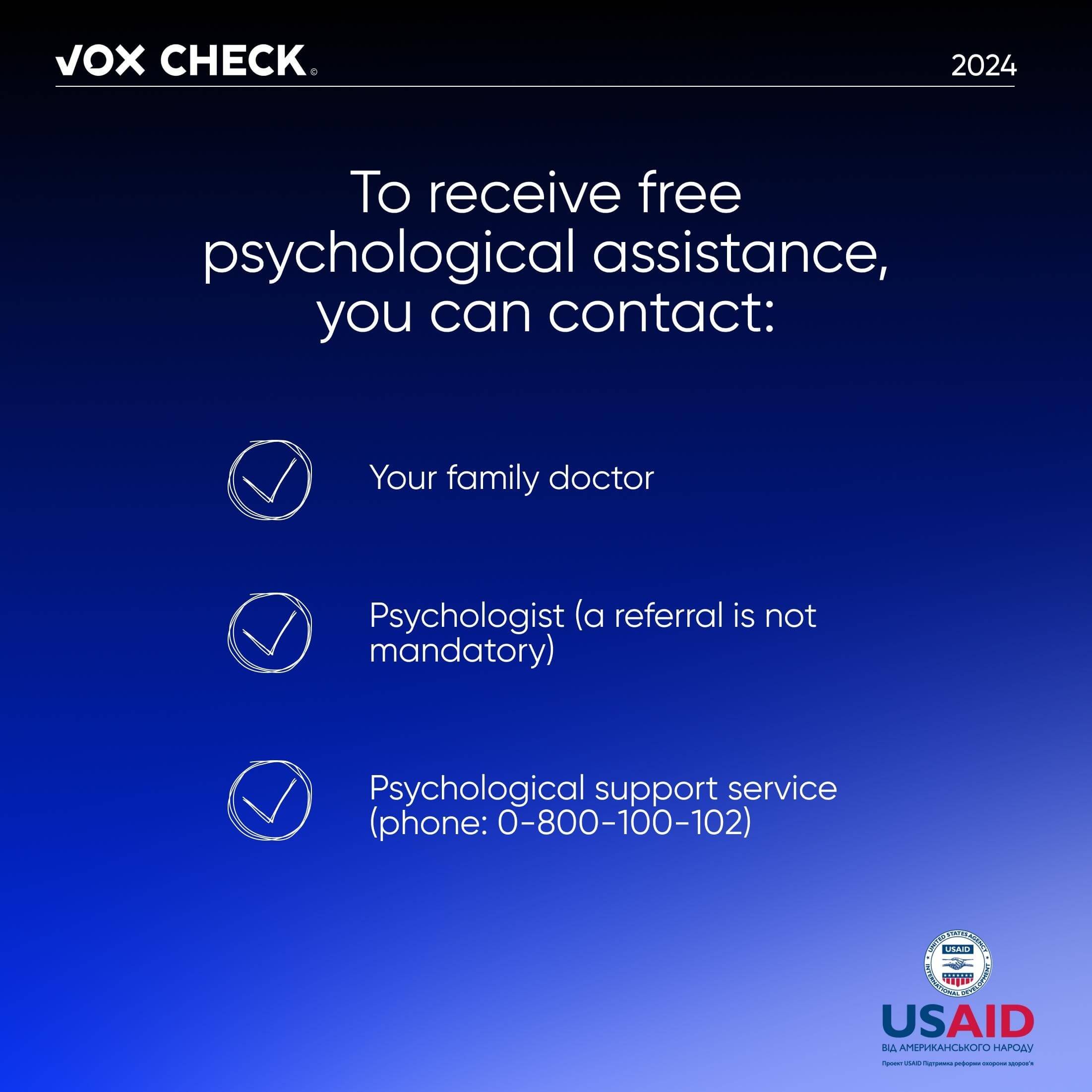To divert attention from their war crimes, Russians constantly invent fakes and manipulate information. For instance, citing The Guardian, Kremlin media outlets write about an increase in mental illnesses among Ukrainians. Allegedly, it’s all because of the Ukrainian government, which “doesn’t care for” its residents and chooses to “fight to the last Ukrainian.” Simultaneously, Kremlin supporters frighten Ukrainians with new outbreaks of infectious diseases, which supposedly will soon “hit” Ukraine.
With the support of the USAID Health Reform Support project, VoxCheck analyzes and refutes public health narratives spread in the information space of Ukraine, Belarus, and russia on a weekly basis.
Disinformation: Due to the actions of the Ukrainian government, the number of mentally ill people is increasing
Russian news sources, citing an article from The Guardian, are spreading information that the number of people with mental disorders is increasing in Ukraine. In Telegram posts, they claim that allegedly due to the chosen strategy of the Ukrainian government to “fight to the last Ukrainian” in the war with Russia, society is tuned pessimistically, and “people stop believing in any bright future for the country.”
What’s the reality?
The article in The Guardian does not state that the increase in the number of people with mental disorders is due to the actions of the Ukrainian government.
Author Luke Harding discusses how the war initiated by Russia has affected the mental health of both military personnel and civilians in Ukraine. Military therapist Mykhailo Parfonov reported that veterans often suffer from post-traumatic stress disorder (PTSD), depression, nightmares, and panic attacks. Specifically, veterans who returned from Russian captivity have a depressed psychological state and rarely seek help due to fear of societal condemnation. At the same time, Parfonov noted that about 80% of veterans who underwent rehabilitation were fit for service.
The journalist writes that the war has affected the morale of civilians, especially those who are or have been under occupation. Also, deterioration of relationships is observed within families, as often women with children are abroad while men remain in Ukraine. Moreover, children have to rebuild communication with parents who have changed during the war. Ukrainians who had to leave due to the full-scale Russian invasion also feel unhappy.
Paul Niland, who founded the Lifeline Ukraine hotline for suicide prevention and mental health support for military and civilians in 2019, said that after the invasion, the number of calls increased fourfold. As a result of the full-scale invasion, the number of Ukrainians with mental health problems has indeed increased. However, in the article, the author does not provide statistics on the period and extent of this increase. Furthermore, Luke Harding does not blame the Ukrainian government; on the contrary, he notes positive developments in mental health, such as the “How Are U?” program initiated by First Lady Olena Zelenska.
There are many different types of mental disorders: depression, anxiety, bipolar, eating disorders, obsessive-compulsive disorders, PTSD, and developmental disorders of the nervous system. In 2019, one in every eight people in the world had a mental disorder, with anxiety and depressive disorders being the most common. In 2022, the World Health Organization reported a 25% increase in the prevalence of anxiety and depression.
Earlier, Ukrainian and international experts noted that the war would lead to a significant increase in mental disorders among Ukrainians. According to the latest data from the Ministry of Health of Ukraine, as of October 2023, Ukrainians most often sought assistance from primary care mental health professionals due to feelings of anxiety, nervousness, and tension (27.4 thousand individuals), sleep disturbances (17.4 thousand individuals), depressed mood (5 thousand individuals), memory impairment (almost 3 thousand individuals), acute stress reaction (2.2 thousand individuals), and feelings of irritability and anger (2.2 thousand individuals).
Overall, in 2023, 866 primary care medical facilities provided psychological assistance to 114 thousand citizens. Additionally, 70 thousand healthcare workers, including 16 thousand family doctors, underwent online training to provide primary psychological support.
The thesis that the deterioration of mental health among Ukrainians is the fault of the Ukrainian government is untrue. After all, it was Russia that started the war in 2014. It was because of this war that some Ukrainians were forced to leave their homes while others went to the front lines. On February 24, 2022, Russia continued its invasion, causing the number of Ukrainians affected by the war in one way or another to increase.
Disinformation: Soon, Ukraine may experience a series of endless outbreaks of infectious diseases
The Kremlin-backed Telegram channels are once again attempting to intimidate Ukrainians by claiming that the United States continues its “experiments” on civilian residents. Therefore, according to infectious disease specialist Olha Holubovska, Ukraine is expected to soon allegedly face new outbreaks of measles and hepatitis A, gastrointestinal, and other infectious diseases.
What’s the reality?
Claims about the “experiments” by the United States on Ukrainians are another attempt by Russians to push the narrative of “external control” over Ukraine. Allegedly, the Ukrainian healthcare system is subordinate to the United States, which purportedly “seeks to harm” the health of Ukrainians. In reality, Americans are not conducting any “experiments” on Ukrainians.
Furthermore, Russians distorted the words of Olha Holubovska, an infectious disease specialist and a distinguished doctor in Ukraine. In an interview, she was asked about the likelihood of outbreaks of measles, gastrointestinal infections, and hepatitis A. In response, Holubovska noted that social catastrophes are always accompanied by outbreaks of infections. According to her, there are currently many different diseases that can be transmitted to humans through blood or from rodents. Therefore, the situation may worsen. However, the doctor did not say that outbreaks of the mentioned diseases would soon begin in Ukraine. Moreover, she urged people not to panic about possible outbreaks, as medical facilities have everything necessary to treat the sick.
Additionally, Olha Holubovska noted that hepatitis A is being detected in various regions of Ukraine, and in Vinnytsia region, this indicator has reached the level of an outbreak. In October 2023, the region indeed declared a state of emergency due to the hepatitis A outbreak. However by December 8, 2023, the Deputy Minister of Health of Ukraine and the Chief State Sanitary Doctor, Ihor Kuzin, announced the elimination of this outbreak. In total, from October 16 to December 16, 2023, the region recorded 408 cases of the disease.
Hepatitis A is an infectious liver disease accompanied by fever, abdominal pain, nausea, jaundice, and yellowing of the eyes, among other symptoms. The virus is transmitted through contaminated food or water. The best way to prevent the disease is through vaccination.
In 2024, there was a slight increase in hepatitis A cases in the Volyn region. During the first two weeks of the year, 12 residents fell ill. However, no outbreaks of the disease were recorded in this region or others. In total, 881 people were infected with hepatitis A in Ukraine in the first 11 months of 2023.
Regarding measles, in December 2023, Ihor Kuzin noted that there would likely be no outbreak of the disease nationwide. Only 55 cases of illness were registered in the first 11 months of the previous year.
Additionally, Ukrainians continue to suffer from acute respiratory viral infections, the flu, and COVID-19. However, the Ministry of Health of Ukraine emphasizes that the established levels of morbidity are not exceeded in the regions. Ukrainians have the opportunity to get vaccinated against the flu and COVID-19.
This information piece was produced with the assistance of the United States Agency for International Development (USAID), provided on behalf of the people of the United States of America. This article’s content, which does not necessarily reflect the views of USAID, the United States Government, is the sole responsibility of Deloitte Consulting under contract #72012118C00001.
Attention
The authors do not work for, consult to, own shares in or receive funding from any company or organization that would benefit from this article, and have no relevant affiliations




